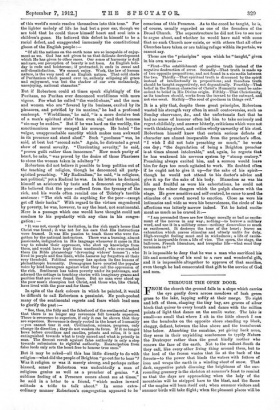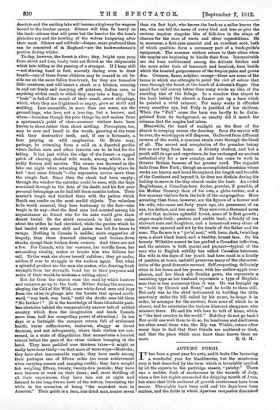THROUGH THE OPEN DOOR.
FROM the church the ground falls in a slope which carries the eye gently down across meadows of lush green grass to the lake, lapping softly at their marge. To right
and left of them, clasping the tiny bay, are groves of silver birch that quiver to every breath and dance with the million
points of light that dance on the sunlit water. The lake is small—so small that where I sit in the little church I can see the hemlocks on the opposite shore standing up black, shaggy, defiant, between the blue above and the translucent blue below. Absorbing the sunshine, yet giving back none, they seem in their unyielding sombreness to typify Nature the Destroyer rather than the great kindly mother who renews the face of the earth. Not to the radiant South do they call, like every other living thing around them, but to the lord of the frozen wastes that lie at the back of the forests—to the power that binds the waters with fetters of iron and wraps the earth in a winding sheet of snow. That dark, suggestive patch dimming the brightness of the sur- rounding greenery is the skeleton at summer's feast to remind us that the clays are approaching when the lady of the mountains will be stripped bare to the blast, and the flame of the maples will burn itself out; when summer visitors and summer birds will take flight ; when the pleasant places will be
desolate and the smiling lake will become a highway for wagons bound to the lumber camps. Silence will then lie heavy on the land—silence that will press but the heavier for the loon's plaintive cry and the howling of the wolves hungering after their meat. Silence and solitude—deeper, more profound than can be conceived of in England—are the backwoodsman's portion during winter.
To-day, however, the forest is alive; tiny, bright eyes peep from shrub and tree, bushy tails are flirted as the chipmunks whisk into hiding at the passing of a stranger. If I keep still —not stirring band or foot, scarcely daring even to draw breath—one of these forest children may be coaxed to sit be- side me on the same fallen tree-trunk, for they are tameable little creatures, and will haunt a shack or a kitchen, running in and out freely and carrying off potatoes, Indian corn, or anything within reach to which they may take a fancy. The " bush" is full of the sound of their small, sweet chirpings, which, when they are frightened or angry, grow so shrill and scolding. Less accessible, in more than one sense, are the ground-hogs, who love, not a tree-top, but a burrow, and whom—harmless though the poor things be, and useless from a sportsman's point of view—summer visitors have been known to shoot rather than shoot nothing. Porcupines, too, may be seen and heard in the woods, gnawing at the trees with their destructive teeth, and, if one is fortunate, a bear preying on wild raspberries. Or Bruin may, perhaps, be returning from a raid on a deserted garden where Indian corn and other luxuries are to be had for the taking. It lies just within the edge of the forest—a ragged patch of clearing choked with weeds, among which a few sickly flowers still survive. The owner was drowned in the lake one night when returning from the township where he had " met some friends "—the expression covers more than the simple fact. Since then the shack had been empty; through the window the calendar could be seen, with the days scratched through to the date of his death, and his few poor personal belongings as he had left them months before. Their master's tragic end touched them with the pathos which Death can confer on the most sordid objects. Too valueless to be worth removal, they bore testimony to the fact—also tragic in its way—that the dead man had counted among his acquaintance no friend who for his sake would give them decent burial. So the shack remained, to fall into ruins about the trifles he had cherished, while the garden which he had tended with some skill and pains was left for bears to ravage. Nothing in Canada is sadder, more suggestive of tragedy, than these deserted clearings and broken-down shacks, except their broken-down owners. And there are not a few. For Canada, with her vastness, her terrific force, her astounding vitality, makes or breaks him who follows her call. To the weak she shows herself ruthless ; they go under, seldom if ever to struggle to the surface again. But what a splendid product are the men she makes, who, drawing fresh strength from her strength, bend her to their purposes and make of their would-be mistress a willing slave I Not far from the church runs the road by which hunters and campers go up to the bush. Hither during the summer, obeying the Call of the Wild, come white-faced men and boys from the cities to plunge into the forests that spread north. ward, " way back, way back," until the Arctic seas bid them "No farther 1" (It is the knowledge of those illimitable path- less stretches behind the comparatively narrow belt of settled country which fires the imagination and lends Canada more than half her compelling power of attraction.) In ten days or a fortnight the campers return full of exuberant health, burnt coffee-brown, unshaven, shaggy as forest denizens, and not infrequently, where their clothes are con- cerned, in a state of dilapidation that necessitates a hurried retreat before the gaze of the other visitors lounging in the hotel. They have paddled over thirteen lakes—it might as easily have been thirty—in that maze of waterways—Muskoka; they have shot innumerable rapids; they have made among their portages one of fifteen miles (no mean achievement when carrying canoes and camping outfit); they have caught fish weighing fifteen, twenty, twenty-five pounds ; they have seen beavers at work on their dams ; and, most thrilling of all their experiences, they have lain out at night and listened to the long-drawn howl of the wolves, luxuriating the while in the sensation of being " the scaredest men in America." Their guide is a lean, sun-dried man, nearer seven than six feet high, who knows the bush as a sailor knows the sea, who can tell the name of every bird and tree or give the curious inquirer singular bits of folk-lore in the shape of charms for the cure of warts and other superstitions. He is, moreover, a first-rate canoeist and an excellent cook, both of which qualities form a necessary part of a bush-guide's equipment. The summer visitors return to their cities when the maples are beginning to kindle their fires. Inconceivable are the hues emblazoned among the delicate birches and the more sober tints of tamarack and hemlock, hues beside which the boasted gorgeousness of the tropics pales and grows dim. Crimson, flame, sulphur, orange—these are some of the terms in which one attempts to paint the riot of colour that runs through the forest at the touch of Autumn's finger. One small fact will convey better than many words an idea. of the startling tint of the foliage. In a meadow that sloped to the bush behind the church a farmer put up a barn which he painted a vivid crimson. For many weeks it offended every sensitive eye, but Folly is justified of her children. When the " Fall " came the barn was hardly to be distin- guished from its background, so exactly did it match the crimson that the maples had taken.
Meanwhile, the band of sunlight on the floor of the church is creeping across the doorway. Soon the service will be over, the worshippers will disperse. Gathered from different corners of the world, a common strain runs through the blood of all. The accent and complexion of the preacher betray him as not long from home. A divinity student, and but a youth still in age and experience, he has exchanged an ancient cathedral city for a new country, and has come to work in Greater Britain because of her greater need. The organist bails from New York ; though an accomplished musician whose works are known and loved throughout the length and breadth of the Continent and beyond it, he does not disdain during his holiday to serve in the tiny church under the bush. An exiled Englishman, a Canadian-born doctor, prouder, if possible, of his Mother Country than of his own, a globe-trotter, and a few summer visitors form the bulk of the congregation. More arresting than these, however, are the figures of a farmer and his wife, who came out forty years ago, the possessors of an axe, ten dollars, and two sons. They now own a thousand acres of soil that includes splendid forest, some of it first growth ; sugar-maple bush ; pasture and arable land; a family of ten stalwart sons and daughters, and a homestead every stone of which was squared and set by the hands of the father and his eons. The farmer is a " jov'al soul," with keen, dark, twinkling eyes, a short black beard, and a healthy, honest face. On his homely Wiltshire accent he has grafted a Canadian inflection, and the mixture is both quaint and piquant—typical of the man who to English solidity has added Canadian keenness. His wife in the days of her youth had been maid in a family of position at home, and still preserves many of the character- istics of the good domestic servant. Self-respecting, delicately clean in her home and her person, with her mellow-apple com- plexion, and her black silk Sunday gown, she represents a vanishing type as her husband represents a type of English- man that is less numerous than it was. He was brought up to "hold by Church and State," and be holds to them still. Not only was he the chief instrument in building the little sanctuary under the hill called by his name, he keeps it in order, he arranges for the services, from none of which he is absent, and he entertains the various itinerant clergymen who minister there. He and his wife love to talk of home, which is " the best country in the world." But they do not go back ! Nor could one wish them to do so, for loneliness and disillusion too often await those who, like Rip van Winkle, return after many days to find that their friends are scattered or dead, and that the place which once knew them knows them no







































 Previous page
Previous page